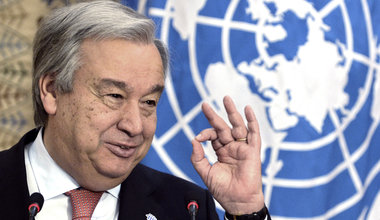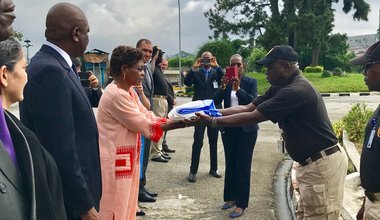Summary of UNOCI weekly press conference Abidjan, 9 June 2011)
UN DRAWS ATTENTION TO HUMAN RIGHTS VIOLATIONS AND HIV/AIDS
Insecurity, human rights violations, the stigmatisation of persons living with HIV/AIDS and the role of peacekeepers in the prevention of HIV were among the issues tackled during the weekly press conference of the United Nations Operation in Côte d'Ivoire (UNOCI) on Thursday, 9 June 2011.
Expressing his concerns over violent incidents between elements of the Forces républicaines de Côte d'Ivoire (FRCI) and inhabitants of certain localities, the Acting Director of the Human Rights Division, Guillaume Ngefa, recommended launching immediate and impartial inquiries into them. "The alleged perpetrators of these serious human rights violations must be identified, pursued and punished in accordance with the law," he said.
The FRCI should also be given sufficient and appropriate means to maintain law and order, he added.
According to Mr. Ngefa, "the government and the FRCI authorities should initiate training for FRCI elements, especially on human rights and the basic principles on the use of force and the use of firearms by those responsible for applying the law".
With regard to the observation of the questioning of seven collaborators of former President Laurent Gbagbo detained in a prison in Bouna, Mr. Ngefa noted with satisfaction that the questioning had gone well in the presence of their lawyers, but deplored the conditions of detention.
For her part, the UNAIDS Country Co-ordinator, Dr. Claire Mulanga Tshidibi, spoke about the high-level meeting of the UN General Assembly in New York on AIDS, an anti-stigmatisation campaign which has just started and a new UN Security Council resolution on AIDS and the prevention of sexual violence during conflicts.
Dr. Mulanga welcomed the holding of the New York meeting which in her opinion "will be an opportunity to assess the progress made and the challenges which remain and to see how the national response can be reoriented after 30 years of the fight against AIDS".
With regard to the progress accomplished, the UNAIDS Co-ordinator said that the level of new infections worldwide had been reduced to 25% during the last 10 years and the number of deaths had gone down to 20% due to treatment. Dr. Mulanga said, however, that though there had been a lot of progress in prevention and mother to child transmission, there had been no progress in some other areas, especially with regard to stigmatisation and discrimination. In order to kickstart the fight to defend the rights of persons living with HIV, an anti-stigmatisation campaign was launched in New York on Wednesday, 8 June 2011. "This multimedia campaign in the workplace for United Nations personnel aims to draw attention to the negative impact of HIV, while providing information on HIV/AIDS in general," she said.
Welcoming the adoption of a new UN Security Council resolution on HIV/AIDS and the prevention of sexual violence during conflicts, Dr Mulanga explained that the resolution asks the United Nations and members states to strengthen international and regional partnerships and integrate programmes on the fight against HIV/AIDS into conflict prevention initiatives in order to ensure security and preserve peace.
In this regard, she explained that peacekeepers could be a driving force in the prevention of HIV, since sexual violence had been used as a weapon of war in several countries. "We must involve them from now on, not only in terms of training the soldiers, but also in the sensitisation of communities and the prevention of sexual violence," she stressed.
And in addition, "programmes for the fight against AIDS aimed at peacekeepers must be widened and strengthened so that they can really guarantee an effective response to HIV/AIDS and sexual violence in a conflict and post-conflict environment," she added.
Asked about the impact of the crisis in Côte d'Ivoire, Dr. Mulanga said that "areas that were affected by the conflict are seeing a loss in the gains made in the fight against HIV/AIDS...and this has particularly affected those who are ill and were not able to receive continuous care, or were not eating well and the interruption of programmes due to the economic embargo".
 ONU
ONU Nations Unies Maintien de la paix
Nations Unies Maintien de la paix




